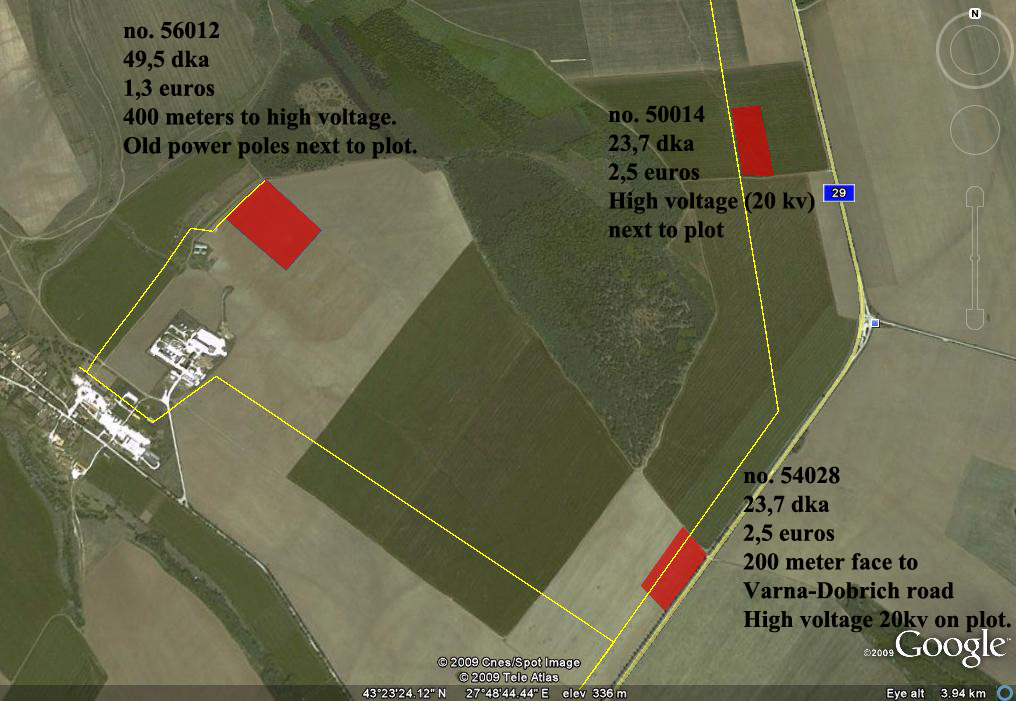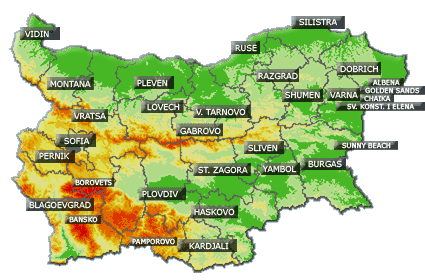Holiday resorts and big Bulgarian cities do not seem such an attractive investment opportunity for foreign property investors any longer. Now, an increasing number of private and institutional investors see more value and profitability in agricultural and development land, consultants at Sash Property Solutions (SPS) said as quoted by nubricks.com, UK property blog.
SPS does an independent research of the Bulgarian real estate market and its recent findings showed that prices of agricultural land had risen by 40 per cent. The consultant company attributed this new trend to the lower risk and less involvement for potential buyers as opposed to buy-to-let and commercial properties. Compared to other European countries, agricultural land in Bulgaria much cheaper.
The tendency was to buy agricultural land in an attractive location, go through the process of regulation and re-sell it for a handsome profit, SPS advised. The downside of this procedure was the regulation process, which turned out to be a long, frustrating and time-consuming effort.
Nubricks.com quoted a former investor in agricultural land near Bourgas, who bought the property for nine euro a sq m. Two years later, after completing the regulation procedure, the owner sold the plot for 60 euro a sq m to a developer whose intention was to build holiday houses.
The property consultants also suggested that land in the periphery of the big cities appeared to be a good investment as well. Most cities’ development planning would soon feature enlargement toward the available vicinity plots. In a long run, the land price will increase and generate an easy profit at minimum risk, SPS said.
Bulgaria: China's Gateway to Europe.
Bulgaria could become part of the China-Europe high-speed rail link.
A Bulgarian government delegation will visit Beijing for talks about key areas of transport (including railway freight traffic) and concessions of ports and airports.
The Bulgarian delegation will be led by Transport Minister Alexander Tsvetkov. It will be in China October 28-31, following a visit to South Korea.
It comes after of months of intensive contacts between the Bulgarian government and Chinese central and provincial authorities, as well as contact with companies on various potential joint projects. The projects include the Bozhurishte Industrial Zone (near Sofia) and other projects, near Varna.
Bulgaria's Economy Minister Traicho Traikov has said, that China is interested in receiving Bulgarian airports and ports concessions China will use them as a base for its exports to the EU and the wider Europe.
The Bulgarian delegation will visit the Ministry of Railways in Beijing. Bulgaria and China will consider options for long-term joint ventures, between the Freight Directorate of the Bulgarian state railway, and Chinese railway operators.
These talks are part of China's project to launch a railway connection to Central and Western Europe, through Central Asia, Turkey, and Bulgaria, the so called "China-Europe high-speed rail link".
Bulgaria's Transport Minister Alexander Tsvetkov will meet with the largest port operator in China, COSCO Group. COSCO Group is looking for concessions of Bulgarian ports. Varna Port is the largest Bulgarian port. Meetings with airport operations are also part of Tsvetkov's program.
The delegation will end its trip in Shanghai for the closing ceremony of the Schanghai Expo.
Chinese Businessmen: Bulgaria is Most Important Balkan State.
Business | October 11, 2010, Monday
Chinese businessmen have suggested that Bulgaria should increase the marketing and advertising of its goods in China, in order to boost the consumers' interest.
The suggestion was made by Wan Jifei, the Chair of the China International Trade Promotion Committee.
He led a delegation of 22 Chinese companies, which took part Monday in a joint forum with Bulgarian companies organized by the Bulgarian Chamber of Commerce and Industry (BCCI).
According to Jifei, Bulgarian producers should participate in exhibitions and fairs in order to popularize their products in the People's Republic. He also pointed out the opportunity of organizing a joint project for advertising between BCCI and the Chinese institution.
“Bulgaria is the most important country in the Balkans, and one of the markets with greatest potential in Central and Eastern Europe. One of the major reasons for the interest of Chinese companies in Bulgaria is the fact that with its good geographic location, it can turn into a door to Europe and its markets,” Jifei declared.
Bulgaria's Economy Minister, Traicho Traikov, has stated that there is an opportunity for traditional Bulgarian products, like yogurt, wine and essential oils to be promoted in China.
"However, we owe the business. We need to provide a better infrastructure and logistics,"Traikov said.
He has reiterated the government's intention to turn Bulgaria into "the EU door for Chinese imports."
Chinese companies have participated in several business forums with Bulgaria in the last few months. Traikov, as well as Bulgaria's Finance Minister Simeon Djankov, visited China, in order to present the opportunities for investment in Bulgaria.
So far, China and Bulgaria has agreed to create a joint company to operate the future business zone in Bozhurishte, near Sofia.
According to information from the Bulgarian Ministry of Economy, the Bozhurishte project has an area of about 500 acres and close to 1/3 of them will be allocated to Chinese companies.
Minsiter Traikov has stated that Chinese companies are interested in investing in the fields of electronics, infrastructure, energy, agriculture, engineering and construction materials.
Bulgaria's Deputy Economy Minister, Evgeni Angelov, has stated that China also wanted to invest in the construction of the Belene nuclear power plant, Hemus Highway and in Kozloduy NPP.
Traikov has explained that the investment model has become more transparent. "The model includes funding from the China Development Bank and from the US Eximbank to companies, which want to invest in Bulgaria," he said.
In 2010, the trade between Bulgaria and the People's Republic of China started growing again, with a total value of USD 653 M in January-August 2010, a 36% increase year-on-year, according to the China International Trade Promotion Committee. According to data of the Bulgarian National Statistical Institute, Bulgaria's exports to China grew by 252.3%, year-on-year.
Please search www.varna-albena.com (and www.bulgarialandsale.com) for more information about Bulgaria, Varna and in land around Varna for investment, commercial and industrial purposes.
Varna is the second largest economic zone in Bulgaria and a major logistics and production center, due to Varna International Airport, the modern Varna Port, International railway links and motorways connecting Varna and Bulgaria with the Black Sea countries and the Balkan peninsula.
Varna City (Bulgaria) is a major gateway to the rest of Europe and EU, and production costs and land prices are the lowest in all of Europe.
保加利亞:中國的通往歐洲。
保加利亞有可能成為中國的一部分,中歐高速鐵路。
保加利亞政府代表團將訪問北京談關鍵領域的運輸(包括鐵路貨運)和優惠的港口和機場。
保加利亞代表團將由交通部長亞歷山大 Tsvetkov。這將是在中國 10月28號至31號,以下訪問了韓國。
它有個月的緊張之後,保加利亞政府之間的接觸與中國中央和省級機關,以及與公司聯繫的各種可能的聯合項目。這些項目包括Bozhurishte工業區(近索非亞)和其他項目,近瓦爾納。
保加利亞經濟部長 Traicho Traikov所說,中國有興趣收到保加利亞機場和港口的優惠,中國將使用它們作為一個基地,其出口到歐盟和更廣泛的歐洲。
保加利亞代表團將訪問鐵道部在北京舉行。保加利亞和中國會考慮的選擇長期合資企業之間的貨物首長保加利亞國家鐵路,中國鐵路運營商。
這些談判的一部分,中國的鐵路項目,啟動連接中歐和西歐,通過中亞,土耳其,保加利亞,所謂的“中國與歐洲的高速鐵路連接。”
保加利亞交通部長亞歷山大 Tsvetkov將與中國最大的港口運營商,中遠集團。中遠集團正在尋找優惠保加利亞港口。瓦爾納港是保加利亞最大的港口。會議還與機場業務的一部分,Tsvetkov的方案。
該代表團將結束在上海的行程閉幕式的Schanghai博覽會。
中國商人:保加利亞是巴爾幹地區最重要的國家。
商業 | 2010年10月11號,星期一
中國商人認為,保加利亞應增加營銷和廣告其產品在中國,以增加消費者的利益。
這項建議是由萬季飛會長,主席對中國國際貿易促進委員會。
他率領的代表團 22日中國公司,參加週一在保加利亞公司聯合舉辦的論壇,由保加利亞商會和工業(國商)。
據季飛,保加利亞生產者應當參加展覽會和交易會,以推廣他們的產品在人民共和國。他還指出,有機會組織一個聯合項目的廣告和中國之間的國際商業信貸銀行機構。
“保加利亞是最重要的國家在巴爾幹地區,而其中最有潛力的市場,在中歐和東歐。其中一個主要的原因是利益的中國公司在保加利亞的事實是,憑藉其良好的地理位置,它可以變成一門歐洲及其市場,“季飛宣布。
保加利亞經濟部長 Traicho Traikov曾指出,有一個機會,保加利亞的傳統產品,如酸奶,葡萄酒和香精油對擬提拔的中國。
“但是,我們欠的業務。我們需要提供一個更好的基礎設施和物流,”Traikov說。
他重申,政府打算把保加利亞成為“歐盟對中國進口的大門。”
中國公司已經參與了一些與保加利亞商業論壇在過去數個月。 Traikov,以及保加利亞財政部部長西蒙Djankov訪問中國,以目前在保加利亞的投資機會。
到目前為止,中國和保加利亞已經同意建立一個聯合公司經營在未來的商務區 Bozhurishte,近索非亞。
據了解,從保加利亞經濟部,該 Bozhurishte項目的面積約 500畝,接近1 / 3,他們將被分配給中國公司。
Minsiter Traikov曾表示,中國公司有興趣投資於電子領域,基礎設施,能源,農業,工程和建築材料。
保加利亞經濟部副部長,葉夫根Angelov曾指出,中國也想投資興建的Belene核電廠,Hemus公路和科茲洛杜伊核電站。
Traikov解釋,投資模式已變得更加透明。 “這種模式包括資金,由中國開發銀行和進出口銀行從美國的公司,它希望在保加利亞投資,”他說。
2010年,貿易,保加利亞和中華人民共和國的中國開始恢復增長,總價值美元653 M在一月至2010年8月,36%的年升幅,按年,根據中國國際貿易促進委員會。據資料,保加利亞國家統計研究所,保加利亞的出口增長了252.3%,中國,按年升幅。
請搜索 www.varna-albena.com (和 www.bulgarialandsale.com) 的更多信息,保加利亞瓦爾納和瓦爾納附近土地的投資,商業和工業用途。
瓦爾納是世界第二大經濟區在保加利亞和主要的物流和生產中心,由於瓦爾納國際機場,現代化的瓦爾納港口,國際鐵路和高速公路連接的聯繫和保加利亞瓦爾納與黑海國家和巴爾幹半島。
城市瓦爾納(保加利亞)是一個主要門戶,其餘歐洲和歐盟,生產成本和土地價格是最低的整個歐洲。最便宜的土地出售,在歐洲,在保加利亞。
Back to home page: www.bulgarialandsale.com
-Български недвижими имоти новини. евтини български имоти за продажба в Варна, Златни Пясъци и Албена.
-Болгарский недвижимости. дешевые болгарские собственность на продажу в Варна, Золотые Пески и Албена.Болгарский недвижимости. Сайт для земельных инвестиций в Болгарии, сельскохозяйственные земли в Болгарии, строительные участки в Албена Камчия и курортов, и дешевых земельных участков Варна, Албена, Балчик.
KEYWORDS: Bulgaria property. Bulgarian property. Bulgarian properties. bulgarian real estate. Konstantinovo. varna. varna property. Bulgaria land. land in bulgaria. land sale. land for sale. cheap land bulgaria. osenovo. kamchia. bliznaci. blisnatsi. bulgaria golden sands. albena. golf land bulgaria. black sea property. Болгария недвижимость. Болгарский земли гольфа, Варна. Черное море. Константиново. дешевые земли Болгарии, bliznaci, Болгария Золотые Пески, България недвижими имоти. Българската земя от голф игрището, Варна. Черно море. Константиново. евтина земя парцел България, bliznaci, България, Златни пясъци. overseas property. Bulgaria. bulgaria, bulgaria,land,solar,photovoltaic,wind,renewable,energy, alternative, green energy, vind energi, sonnen energie, electricity land, plot, building plot, bulgaria property investment, agricultural land bulgaria, farmland, Varna land, Rogachevo, Albena, bulgarian land,property in bulgaria, land for sale, land for sale in bulgaria,cheap land, buy land, grunde bulgarien, landbrugsjord bulgarien, køb landbrugsjord, bulgarien, bulgaria land, konstantinovo, golf course varna, albena golf, balchik, osenovo, albena golf course, black sea, company registraion bulgaria, property taxes bulgaria, България, недвижими имоти, bulgaria property, Болгария недвижимость. Болгарский земли гольфа, Варна. Черное море. Константиново. дешевые земли Болгарии, bliznaci, Болгария Золотые Пески, България недвижими имоти. Българската земя от голф игрището, Варна. Черно море. Константиново. евтина земя парцел България, bliznaci, България, Златни пясъци. overseas property, Erneuerbare Energien, regenerative Energien, Alternativenergien, Solarenergie, Windenergie, Windkraftanlagen, Strom, alternative, umweltfreundliche Energie, erneuerbare Energien, Photovoltaik, Sonnenenergie, Sonnenkollektoren, Windmühlen, Windenergieanlage, Photovoltaikanlage, Sonnenkollektor, Windpark ,




